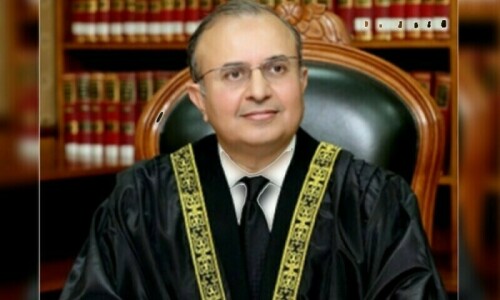With the Pakistan National Alliance (PNA) now part of the government, the spotlight returned on the Pakistan People’s Party (PPP). On November 18, 1978, Begum Nusrat Bhutto — kept under house arrest — was released by the Lahore High Court (LHC), which in December deemed her detention to be illegal. Immediately after, Begum Bhutto met her lawyers and sought a realistic assessment of the overall situation.
The situation within the PPP was not satisfactory. It began in January 1978, when some of the party’s leaders began meeting with martial law authorities. No one understood the developments taking place behind the scenes when Maulana Kausar Niazi and Ghulam Mustafa Jatoi had begun pressing PPP supporters to not adhere to the policy of agitation on the pretext that it was aggravating the situation.
At the time, the Bhutto ladies — Nusrat and Benazir — had little contact with the party’s workers, thus creating a credibility gap. Begum Bhutto wanted Benazir to assume control of the party but Maulana Niazi objected to this strategy; on February 24, he held a press conference and publically asked Begum Bhutto to handle the affairs of the party instead of Benazir.
The major sticking point for this intra-party dissent was the approach to be taken for handling the situation vis-à-vis the military. Jatoi and Niazi wanted some kind of reconciliation, while Benazir wanted to show street power. Maulana Niazi argued this would invite harsher curbs on the party. In April, Maulana Niazi met some like-minded PPP leaders, including the party’s deputy secretary, Mir Afzal, Hanif Khan, as well as former NWFP chief minister, Nasrullah Khattak.
Eventually, only one People’s Party was to survive — that of the Bhuttos
This group would later be called the “liberal” faction of the PPP. While Gen Zia was speaking with the PNA, he also gave time to this liberal group that was led by Maulana Kausar Niazi. A formal meeting had already taken place on April 15, where the two had discussed the national government, elections and other administrative affairs. The same day, a delegation of Tehrik-i-Istaqlal, comprising Mushir Peshimam, Mahmood Ali Kasuri and Munir Hussain called on Gen Zia. The team was told that the absence of Asghar Khan was felt. On April 27, Khan announced that his party would not join the national government.
It was yet to be assessed how Gen Zia was receiving the liberal group of the PPP. On May 18, Maulana Niazi once again met with Gen Zia, and later with members of the Election Cell. The next day, Maulana Niazi officially announced the formation of the PPP’s “liberal” faction, of which he was the acting chairman. This announcement came following a meeting of like-minded PPP workers on May 19 at Khattak’s residence. Following the meeting, Kamal Azfar told media personnel that the PPP had undergone some reorganisation, according to which Maulana Niazi had been elected as the acting chairman. This, he said, had been necessitated by Begum Bhutto’s detention.
Begum Bhutto wanted Benazir to assume control of the party but Maulana Niazi objected to this strategy; on February 24, he held a press conference and publically asked Begum Bhutto to handle the affairs of the party instead of Benazir.
Meanwhile, back in the Supreme Court, the chief justice had ruled that the appeal hearing would be held on a daily basis, and that there was no need for the former prime minister to make physical appearances in court at that stage. But on May 21, Zulfikar Ali Bhutto’s lawyer, Yahya Bakhtiar, complained that Bhutto had not eaten since the past three days. The chief justice directed the prosecution lawyer M.A. Rahman to inquire about the matter and report back. On May 23, Bhutto’s lawyers also visited the jail and said that he was taking food normally.
On the other hand, reports of squabbles among the PNA’s constituent parties continued to emerge. To review the disagreement, the Alliance held a meeting on May 23 in Lahore. The Alliance’s leaders deliberated various issues, including the lesser interest of the National Democratic Party (NDP). A number of disciplinary decisions were also taken, of which the major ones pertained to the Jamiat Ulema-i-Pakistan (JUP).
The meeting reviewed the recommendations of the sub-committee formed to dispose of JUP’s complaints. Some demands were accepted, but the leaders resolved that any amendment to the constitution of the Alliance would be made if consensus was evolved. The JUP did not agree to the reconciliation efforts, and finally it parted ways with the Alliance.
Since Benazir had been detained in Karachi, she was flown to Rawalpindi on June 2, where she met her incarcerated father. Benazir was not allowed to stay with her mother in Lahore either; she was flown back to Karachi the same evening.
Begum Bhutto visited her husband on June 5. When she reached the jail, she was asked to hand over her bag for a security check, and later refused permission to go inside with her bag. Begum Bhutto protested and returned without meeting her husband. Her lawyer complained about this incident to the court, while the jail superintendent also wrote a letter to the court explaining their position.
The same evening, Bhutto’s two lawyers, Ghulam Ali Memon and Dost Mohammad Awan visited Bhutto and found that no doctor had visited Bhutto and due to his not consuming any food he had become too weak. The court then formed a committee which had to visit Bhutto’s cell, and ensure that all facilities that were allowed by law were made available to him.
Published in Dawn, Sunday Magazine, November 9th, 2014














































